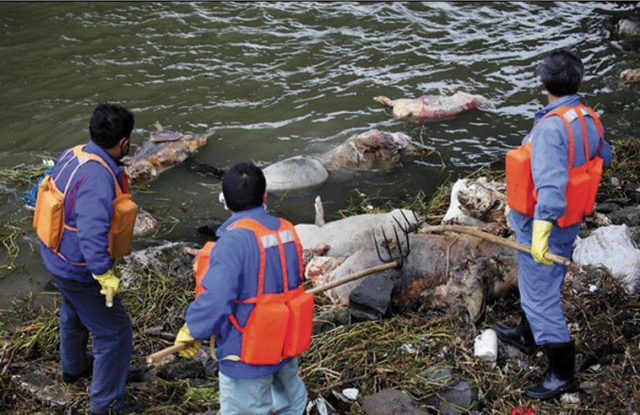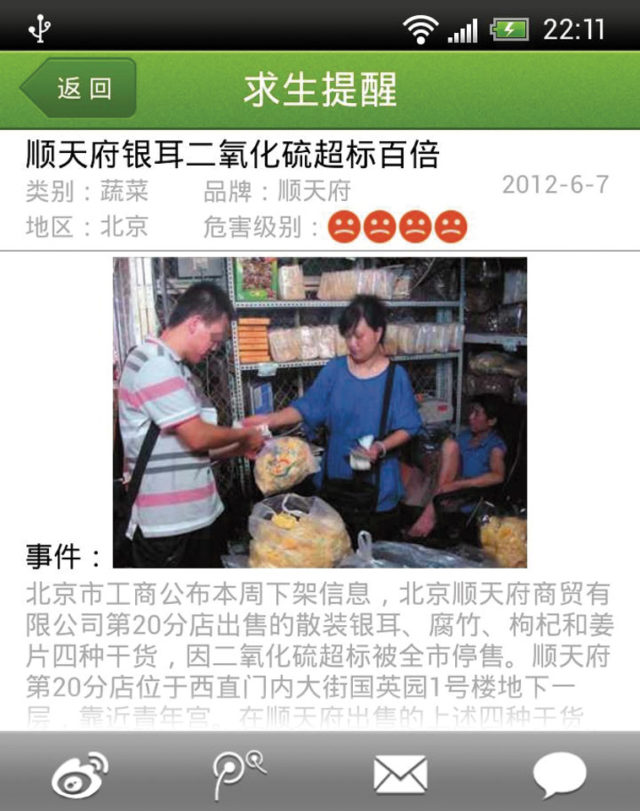Food is essential, and safety should be a top priority. Food safety is closely related to people’s lives and health, economic development and social harmony. We must create a food safety system of self-disciplined food companies with integrity, effective government supervision and broad public support to improve overall food safety.
Li Keqiang,
then head of the National Food Safety
Commission, State Council, April 2010
Since the melamine milk scandal of 2008, food safety has been a top priority for parents, journalists and people generally in China. In 2011, a Fudan University student built a website called Throw it Out the Window (zhengchu chuangwai 掷出窗外 www.zccw.info) that aggregated reports related to food safety dating back to 2004. As we noted in the 2012 Yearbook, a Zhejiang-based software company launched an iPhone app called China Life Saving Manual (Zhongguo qiusheng shouce 中国求生手册) that sends updates of the latest food scares to users’ mobile phones.
The topic of food safety is not always a pressing personal concern for government officials, as highly ranked cadres can also obtain provisions through the elite channels (known as ‘special supplies’, tegong 特供, short for teshu gongying 特殊供应). Below is a list of some of the major food safety scandals reported in the Chinese media.
Plasticiser in Liquor
In November 2012, the Chinese media reported that samples of liquor made by Jiu Gui Jiu Co., a Hunan-based distiller, were found to contain plasticiser 2.6 times higher than the maximum level stipulated by national standards, apparently as a result of the use of plastic piping during production. China’s quality watchdog, the General Administration for Quality Supervision, Inspection and Quarantine (AQSIQ, Guojia zhiliang jiandu jianyan jianyi zongju 国家质量监督检验检疫总局) issued a test result supporting the media report. The Shenzhen Stock Exchange put a hold on trade in the company’s shares for several days.
Other premium Chinese grain wines (白酒 baijiu), including Moutai and Wu Liang Ye came under the spotlight as well. In December, an online post cited the results of a test conducted by a Hong Kong laboratory indicating that the plasticiser level in samples of Moutai was twice as high as the national limit. Discussions as to whether the national standards were too rigorous were soon muted by public criticism. In April 2013, media reports said that imported bottles of Camus, Frapin and Rémy Martin cognac were turned back at Chinese customs for the same reason.
Rat Meat for Mutton
In May 2013, the Ministry of Public Security released results of a three-month crackdown on food safety violators, saying that authorities investigated more than 380 cases and arrested 904 suspects. Among those arrested were sixty-three people who allegedly ran an operation in Shanghai and the coastal city of Wuxi that bought fox, mink, rat and other meat that had not been tested for quality and safety, processed it with additives like gelatin and passed it off as lamb. The meat was sold at farmers’ markets in Jiangsu province and Shanghai.
Poisonous Milk and Infant Formula
Safety scandals continue to plague the dairy industry. In August 2012, a cheese product made by Shanghai-based Bright Dairy 光明乳业 for babies was removed from shelves nationwide for containing a banned mineral additive (not melamine) that could also potentially harm the kidneys. Early in September, nearly 1,000 households in Shanghai bought sour milk produced by the same company. In June 2013, Bright Dairy milk was found to be contaminated with an alkaline solution. In July, excessive bacteria in its butter and cheese saw those products removed from the shelves as well.
Scandals also befell other major brands, foreign and domestic alike. In June 2012, a university student, claiming to have interned at a Mengniu 蒙牛 ice cream factory, posted pictures to the Internet showing unsanitary conditions. The post circulated widely on social media and the company apologised. In April 2013, the authorities in Suzhou, Jiangsu province, raided a subcontractor of Hero — a Swiss dairy brand — alleging that the subcontractor had been illegally repackaging and selling baby formula with protein counts below national standards.
There were many other safety scandals involving infant formula in 2012 and early 2013, leading Chinese parents to scour the world’s supermarkets for untainted milk for their babies. New Zealand, Hong Kong and the Netherlands are among the countries that have imposed restrictions on the bulk purchase of infant formula to prevent Chinese speculators from buying up all available stock.
Gutter Oil
In August 2012, the media reported that Joincare Pharmaceutical Group 健康元药业 in Jiaozuo, Henan province, used cooking oil reprocessed from the kitchen waste found in gutters behind restaurants to make a widely used antibiotic. The State Food and Drug Administration subsequently investigated. The company denied any knowledge of the use of gutter oil, arguing that it was impossible to recognise it by testing, that the oil didn’t go into the final product, and that it was used only in an intermediate stage of processing.
In January 2013, Caixin Century (Caixin xinshiji zhoukan 财新新世纪周刊) published an exposé of a Shandong businessman named Liu Liguo, who amassed a fortune selling gutter oil to small, greasy-spoon restaurants and food factories.
Water
In an article published on the People’s Daily website in January 2013, Zhao Feihong — head of the Beijing Institute of Public Health and Drinking Water — said that her family had not drunk the city’s tap water for twenty years, using bottled mineral water to drink, make tea and cook rice. Though Zhao refrained from criticising China’s tap water standards or lack thereof, many people promptly abandoned tap water for the supposedly safer bottled water.
However, not all bottled water is safer than tap. In April, the Beijing Times (Jinghua shibao 京华时报), a subsidiary of the People’s Daily published an exposé on Nongfu Spring 农夫山泉 bottled water — a major brand — alleging that it contained levels of arsenic and cadmium that exceeded even China’s tap water standards. Nongfu Spring denied the allegations and blamed a competitor for spreading rumours.
In May, The Beijing News (Xinjingbao 新京报) ran an article saying that China still follows regulations adopted from the Soviet Union to test bottled drinking water. According to these arcane regulations, China’s national health inspectors do not test bottled drinking water for acidity, pH level, or toxic substances such as mercury and silver.
Chicken Licken
On 15 March 2012, CCTV’s annual gala for World Consumer Rights day accused McDonald’s and French retailer Carrefour of selling expired chicken products. The report said a McDonald’s restaurant in Beijing sold chicken wings ninety minutes after they were cooked (the company’s rules set a thirty-minute limit), and that employees at a Carrefour store in the central city of Zhengzhou changed expiration dates on some chicken meat and also passed off battery chickens as the more expensive free-range birds. McDonald’s and Carrefour both issued public apologies.
In December, authorities in Shanghai and Shanxi investigated KFC suppliers following claims that the chicken the company was selling contained excessive quantities of antibiotics. KFC’s parent company Yum! Brands reported a six percent drop-off in sales in China in the final quarter of 2012 and stated that it would step up its screening of suppliers.

Workers trying to fish floating pig carcasses out of the Huangpu River.
Source: Yangcheng Evening News
Floating Pigs in the Huangpu River
During March 2013, thousands of dead pigs showed up in a stretch of the Huangpu River — a main source of Shanghai’s drinking water. Local officials insisted both the water and the city’s pork supply were safe. The authorities never explained how the pigs died or how they ended up in the river. Evidence suggested that farmers upstream in neighboring Zhejiang province dumped the dead pigs after officials cracked down on the practice of selling diseased pork to local markets, while making it very expensive to dispose of the diseased carcasses properly.
Chromium in Capsules
A CCTV program aired on 25 April 2012 revealed a list of medical capsules found to have excessive amounts of chromium. The reporters investigated a number of manufacturers in Zhejiang and Hebei provinces and found that dirty scrap leather containing high chromium concentrations was used to make industrial gelatin, which eventually ended up as medical capsules. The capsules were sold on to pharmaceutical companies, including major pharmaceutical brands.
Ginger
In May 2012, an investigative report by CCTV revealed that farmers in Shandong were using an illegal and highly toxic pesticide on their ginger crops. Farmers in Weifang city had been using the pesticide aldicarb at three to six times above the recommended level. The pesticide is not approved for use on ginger. Aldicarb — branded in China as Shennongdan 神农丹 — is a highly poisonous carbamate pesticide that the Ministry of Agriculture only approves for cotton, tobacco, peanuts, roses and sweet potatoes, with strict controls.



